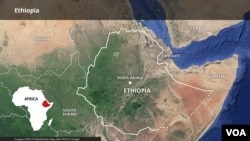A landslide triggered by heavy rains in southern Ethiopia’s Wolaita area killed at least 13 people and the number of fatalities is expected to rise, a local official said Monday.
Samuel Fola, zone chief administrator of Wolaita, said more than 300 people have been evacuated from the area in Kindo Didaye district and that the number of those unaccounted for remains unknown.
“Children are among the dead," said Fola. “We have now evacuated more than 300 people as a precaution and in anticipation of yet another likely major landslide."
A frantic rescue effort was underway in the Wolaita area, according to the regional government.
Monday's landslide appeared to be less deadly than one that occurred last month in another area in southern Ethiopia where more than 200 people were killed.
Landslides are common during Ethiopia’s rainy season, which started in July and is expected to last until mid-September.
With little infrastructure, the mountainous areas of Wolaita have been prone to such accidents.
In 2016, more than 41 people died and hundreds were displaced in the same area after heavy rains triggered a deadly mudslide.
Last month, in neighboring Gamo Gofa, a major mudslide claimed the lives of more than 229 people. The United Nations Office for Human Rights (OCHA) said the toll could be as high as 500.
Deadly mudslides often occur in the wider East African region, from Uganda’s mountainous east to central Kenya’s highlands. In April, at least 45 people were killed in Kenya’s Rift Valley region when flash floods and a landslide swept through houses and cut off a major road.




